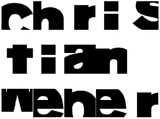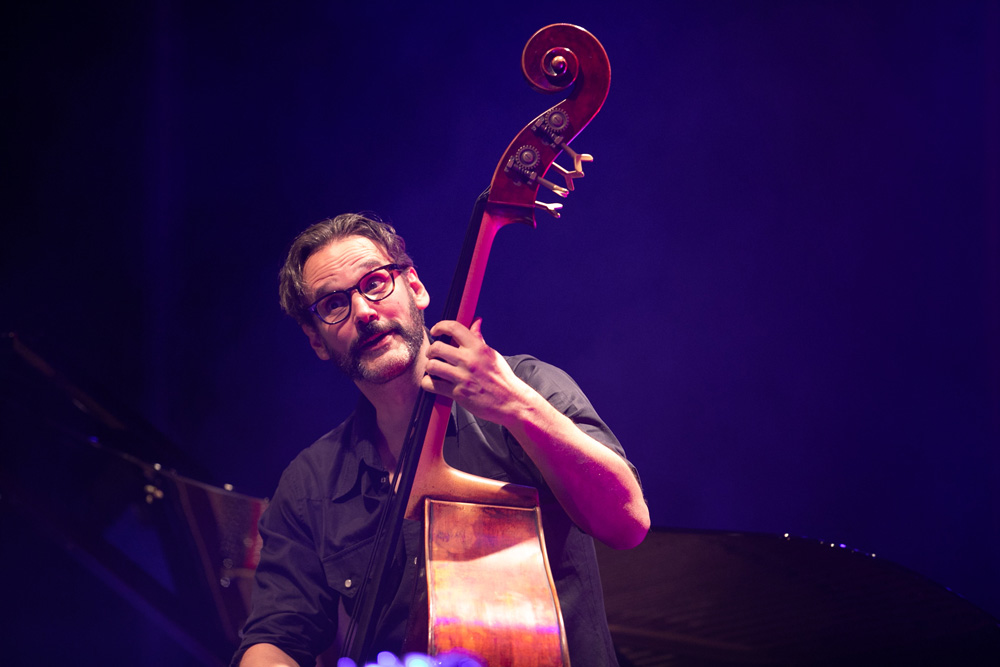 |
 |
 |
|
Christian Weber doublebass, composition, electric bass, electronics Charles Mingus' bass playing, brimming with energy, and his music burning with urgency were a revelation for Christian Weber. Shortly afterwards he got his first double bass and began to explore the new world that was opening up to him. Soon after, he moved to Graz (A) to study with Wayne Darling and Ewald Oberleitner at the University of Music and Performing Arts. Further studies with Adelhard Roidinger at the Bruckner Conservatory in Linz (A) led to a liberation from idioms and an intensive exploration of composed music from the second half of the 20th century and electronic music. Subsequently he was also able to quench his thirst for knowledge with Ernst Weissensteiner in Vienna and Mark Dresser in New York. Christian Weber is still a researcher who is equally interested electro-acoustic improvised music, chamber music, jazz, pop and rock. This diversity does not represent a juxtaposition or crossover; in Weber's music, these different sources are mutually dependent.  «Christian Weber, the double bass player, who you have to hear to believe that a man alone and without electricity brings the richness, the fantasticness of sounds out of the bulky instrument. Weber creaks and growls as if he were attacking the strings with a rasp instead of a bow... Rough violin, apart from euphony, begins to shimmer in an extremely attractive way. The low frequencies boom endlessly, but above the left is scratching the hair that stands on end. The sound itself seems to split, becoming two-part, it is two-handed anyway, pizzicato with one, whipping and clicking with the other, then also twanging with a long reverberation, twänggg, twonggg - the bass as a pure percussion instrument. Strong.» Rigobert Dittmann on Christian Weber's second solo release 'Walcheturm Solo'. Weber's collaborations with musicians such as Johannes Bauer, Han Bennink, Jeb Bishop, John Butcher, Lol Coxhill, Jacques Demierre, Robert Dick, Christy Doran, Gerd Dudek, Paul Dunmall, Ellery Eskelin, Peter Evans, Pierre Favre, Charles Gayle, Frank Gratkowski, Michael Griener, Uli Gumpert, Gerry Hemingway, Jason Kahn, Vera Kappeler, Rob Kloet, Hans Koch, Peter Kowald, Joachim Kühn, Oliver Lake, Joke Lanz, Urs Leimgruber, Paul Lytton, Rudi Mahall, Norbert Möslang, Simon Nabatov, Lucas Niggli , Evan Parker, Olaf Rupp, Alexander von Schlippenbach, Manfred Schoof, Irène Schweizer, Elliott Sharp, Martin Siewert, Aki Takase, Dieter Ulrich, Michel Wintsch, Stephan Wittwer, Nils Wogram, Christian Wolfarth, Michael Wollny, Nate Wooley, Otomo Yoshihide and many others are documented on over 100 recordings. In 2003, Weber received the Culture Prize of the City of Zurich, in 2015 he received a New York scholarship. He is an artistic professor at the Lucerne University of Applied Sciences and has taught as a guest lecturer at the universities in Basel, Bern and Lausanne. From 2012 to 2019 he worked as a lecturer at the Kontrabasskaleidoskop Michaelstein. |
| download |
| german biography (.pdf) english biography (.pdf) |